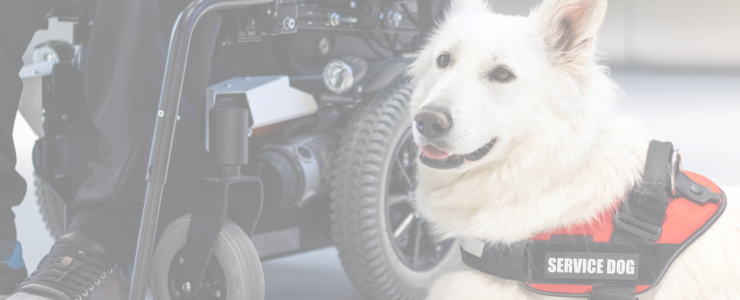Dogs and other animals are great aids and supports to people for a variety of reasons. Service dogs, therapy animals, working dogs, and emotional support animals assist their owners in daily tasks while helping maintain their health and safety. While each of these animals provides critical support, they are not the same, and the terms are not interchangeable. Each role is specifically defined by the tasks performed and the legal protections offered.
Definitions:
Service Dog: A service dog is individually trained to perform tasks and assist individuals with disabilities. This includes physical, sensory, psychiatric, intellectual, or other mental disability.
Working Dog: A working dog is a trained dog that works to perform tasks for a specific purpose. This includes but is not limited to Search and Rescue dogs, allergy alert dogs, or explosive detection dogs.
Emotional Support Animals: An emotional support animal, or an ESA is any animal that provides emotional support to one or more symptoms or effects of a person’s disabilities. Emotional Support Animals are not limited to dogs.
Therapy Animals: Therapy animals are not trained to live with a specific handler but rather an animal that works in a clinical setting, like a hospital, to provide comfort and support to individuals.
Do all these titles have legal rights*?
Yes, but each title has different mandates and laws. For example, the ADA mandates that all service dogs have full public access rights. Under ADA business’ can not ask for documentation for your service animal. ADA also does not require by law that the animal has to wear a vest, ID tag, or specific harness. Establishments may ask you if it is a service animal and/or the task it performs. The service animal must be under the control of handlers. Service dogs are covered under the Washington State Law Against Discrimination as well, which prohibits landlords from discriminating against individuals with disabilities who use service animals.
While ESA is not considered a service animal under ADA laws. ESA requires a letter of diagnosis from the owner’s doctor. They do not have unlimited access to public spaces but are included in Fair Housing Act under “reasonable accommodations”.
Therapy animals are not considered service animals under ADA as well. There are no official uniform or national rules for therapy animals. Therapy animals are not considered service animals under ADA as well. There are no official uniform or national rules for therapy animals.
More Resources:
Washington State Human Rights Commission: Guide to Service Animals and The Washington State Law Against Discrimination: https://www.hum.wa.gov/sites/default/files/public/publications/Service%20Animals%20and%20the%20Washington%20Law%20Against%20Discrimination-032019.pdf
Frequently Asked Questions about Services Animals and the ADA: https://www.ada.gov/resources/service-animals-faqs/
Northwest ADA Center: Service Animal Comparison Sheet: https://nwadacenter.org/factsheet/service-animals-comparison-sheet
ADA National Network Service Animals or Emotional Support Animal: https://adata.org/service-animal-resource-hub/differences
ADA National Network Service Animal Basics: https://adata.org/service-animal-resource-hub/basics
Where to Begin? To get started with getting a service dog, research organizations that train and place the animal with individuals. Reach out to learn about their process, requirements, and the types of service dogs they work with.
*This information is intended to give an overview of the legal rights of service animals in Washington State. It is for educational purposes only and is not a substitute for legal advice.





